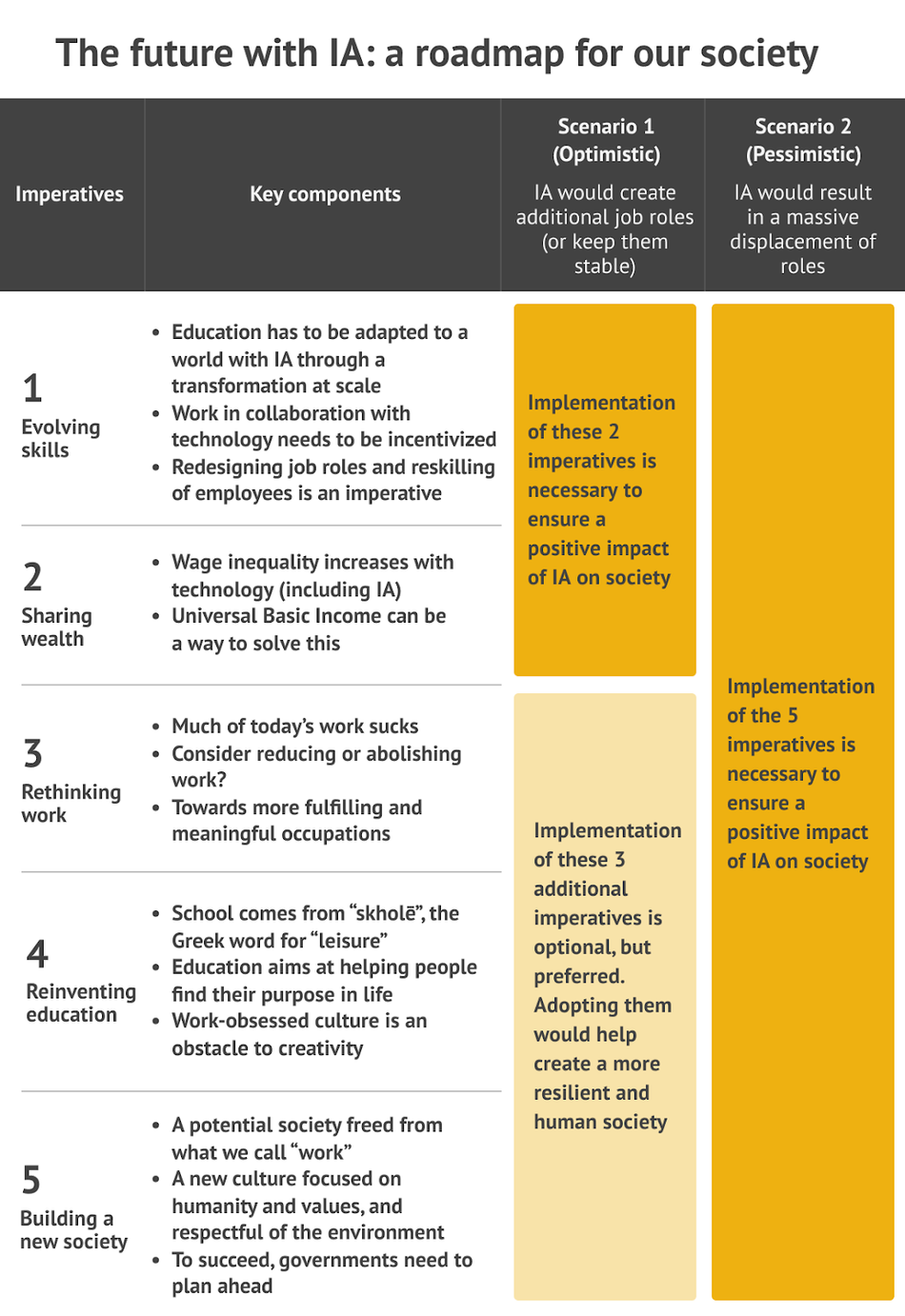Reinventing Society with Intelligent Automation: Preparing for the Outcomes of the Next Industrial Revolution
The fourth industrial revolution has the potential to fundamentally transform the way humans and machines work today. Will it lead to an improvement in the quality of life? Or will it be a cause of widespread job losses and unrest?
Introduction
The fourth industrial revolution, also known as the industry 4.0, is all about intelligent automation. The world around us is digitally evolving, with more and more tasks getting intelligently automated by machines. New data collection, analysis, and communication methods have enabled machines to talk to each other, making many processes more independent and efficient than ever. This marks the beginning of the next industrial revolution that we are all a part of.
In this article, we present a thought-provoking discussion on the possible outcomes of the fourth industrial revolution. We share the consequences of optimistic and pessimistic scenarios of the event and come up with a few imperatives that can help us as a society, prepare for the future.
History of Industrial Revolutions
The first industrial revolution started around 1760 and was centered around the improved use of materials and the development of steam-powered machines. The next one took place around the 1870s and was led by electrical engineering. Strengthening of the railway network, better material processing capabilities, and new machines were some of the notable improvements made possible by electrification during this period.
The third industrial revolution began in 1947 with the development of digital electronics and information technology. Computers, the internet, smartphones, and many products we use today are a result of this digital revolution.
The fourth industrial revolution is the development we are experiencing with the introduction of new cyber-physical systems, the internet of things devices, cloud computing, artificial intelligence, blockchain, additive manufacturing, nanotechnology, and tons of other cutting-edge technologies.
These innovations have the potential to completely change the way we live. But how exactly things turn out, depends on the choices we make today.
The optimistic scenario
Industrial revolutions in the past have brought fundamental and long-lasting transformations in societies. The automation of manufacturing and production processes led to the loss of jobs of people employed in this sector. But at the same time, it created new opportunities for the skilled.
Many economists believe that this time is going to be no different. They believe history will repeat itself, and the fourth industrial revolution will lead to the creation of more jobs than it displaces while improving the quality of life and productivity.
Economists proposing the optimistic scenarios are confident that the time it takes to automate a process would be enough to reskill the workforce so that society is ready for the jobs of the future.
The pessimistic scenario
Believers in the pessimistic scenario consider the recent developments in automation systems unprecedented. Unlike the past improvements which were largely limited to making more powerful electronic and mechanical systems, this time, the control logic gets intelligence, an ability that no machine possessed ever before.
The pace of technological innovations in this domain is constantly accelerating and has reached a point where we are hardly left with any time to retrain the workforce to catch up to it. The changes that happened over a couple of decades in the past, are now happening within a few years.
Experts have reasons to believe machine intelligence will keep getting better to overtake humans in many day-to-day tasks like driving, working at retail outlets, content creation, and more. Ultimately, our society will reach a point where humans will no longer be able to compete with machines.
Without any doubt, the industrial revolution will still create new and better jobs to maintain and upgrade machines. However, they will be far less in number than what the revolution destroys.
To understand the viewpoint, one can consider how automobiles replaced horses as a means of transport. The population of horses in the US declined from 20 million to 4.5 million between the mid-1910s and late 1950s. At present, horse riding is a leisure activity that people just do for fun. In a similar way, the roles of humans may get redundant as intelligent machines take over.
These were just some of the reasons why a large section of society believes the fourth industrial revolution will be different and not in a good way.
Getting ready for both
While we strongly hope for the optimistic scenario to come true, we must also prepare for the pessimistic one. By looking at historic and ongoing developments in an objective way, some imperatives can be defined and worked upon to keep progress sustainable.
Imperative 1: Evolving skills
Governments and private institutions must plan ahead and take proactive steps to instill adaptability in the workforce. Learning what to learn and how to learn are the two important skills to acquire in this age of rapid advancements. Understanding technology is important; however, it is also expected that future jobs might require knowing ‘what’ to do instead of ‘how’ to do it.
Imperative 2: Wealth sharing
A direct consequence of digitalization is an increase in productivity and the creation of value. However, these gains are not equally shared. This further widens the gap between the rich and the poor. To reduce financial inequalities in society, something such as a universal basic income can be considered. Irrespective of the wealth and employment status of an individual, governments can ensure basic needs such as food, shelter, warmth, rest, and safety are met.
Imperative 3: Rethinking work
Every other person experiences burn-out at work. Poor office culture and high workload are the two factors that contribute most to it. To deal with this challenge, intelligent automation can be leveraged as a means to reduce the burden on the workforce. The activities that can be automated must be automated so that people can spend their time working on meaningful tasks. This would let them spare more time for leisure activities and improve their quality of life.
Imperative 4: Reinventing education
Society is obsessed with education and work. Creativity takes a backseat as we confuse our personality and status with work. Instead of being focused on grades, jobs, and incomes, the emphasis must be on the fundamental values of humanity. Value-based education must be imparted to help people find a purpose in their lives.
Imperative 5: Building a new society
Following the four imperatives explained above can help prepare for the next industrial revolution. By redefining education and work, our society can embrace a new culture that focuses on humanity, the environment, and other things that really matter in life.
Conclusion
Machines have always been great at carrying out repeating tasks tirelessly. With the advent of highly connected and intelligent technologies, they are getting faster, smarter, and better. The value derived from the improvements brought in by the next industrial revolution can help in advancing humanity only if shared equally amongst all.
The fourth industrial revolution could be a foundation of a society that encourages creating time for activities that fulfill us and make us more human.
References
[1] Bornet, P. et al. (2020). “Intelligent Automation: Welcome to the world of Hyperautomation”, World Scientific, ISBN: 9789811235849, 9811235848.
[2] Bornet et al., 2017. “Intelligent automation is about creating synergies between RPA, cognitive, chatbots and AI”. https://www.linkedin.com/pulse/from-robotic-process-automation-rpa-artificialai-journey-bornet/
[3] "IEEE Guide for Terms and Concepts in Intelligent Process Automation," in IEEE Std 2755-2017, vol., no., pp.1-16, 28 Sept. 2017, DOI: 10.1109/IEEESTD.2017.8070671.IEEE Std. 2755-2017, IEEE Guide for Terms and Concepts in Intelligent Process Automation.


